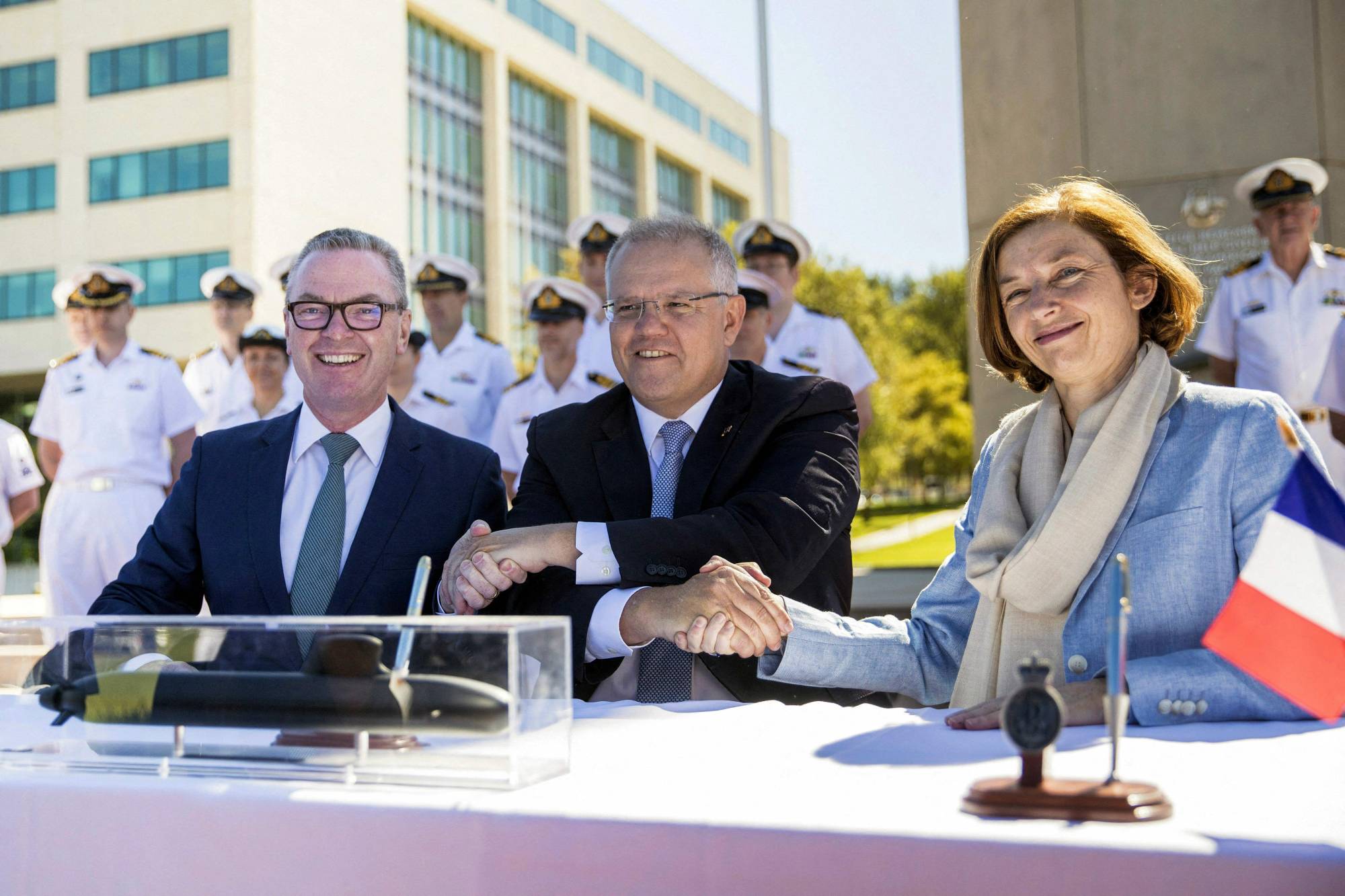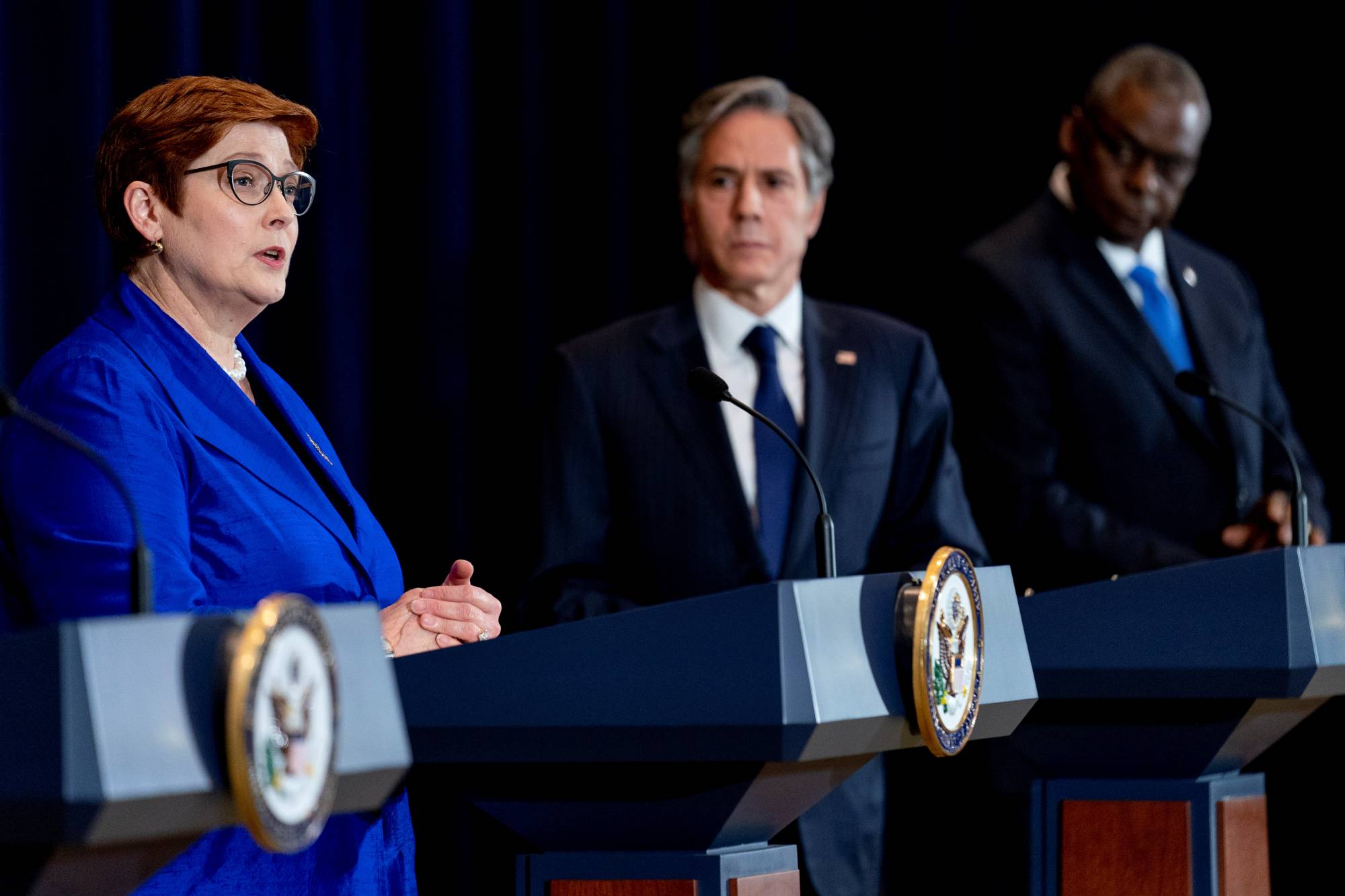The administration of U.S. President Joe Biden is struggling to assuage French anger over Australia’s surprise decision to abandon a multibillion-dollar submarine contract with France in favor of U.S. technology, a move viewed in Paris as a betrayal that seriously damaged trans-Atlantic ties.
“We had no heads up,” said Pascal Confavreux, the French Embassy spokesman in Washington. “We learned it when U.S. media broke the news, and at that time we made a demarche to get more information about what we had learned,” he added, referring to a diplomatic meeting often undertaken during a dispute.
The French foreign minister, Jean-Yves Le Drian, was more blunt, saying his nation, whose friendship with the U.S. dates to the American Revolutionary War, felt “stabbed in the back.” Officials then promptly canceled a gala in Washington and Baltimore, Maryland, this week that was to celebrate close Franco-American ties.
The U.S.-U.K.-Australia agreement, announced Wednesday, scuppered a 2016 deal that Australia sealed with France to acquire 12 diesel-powered subs from shipbuilder Naval Group. Officials said it was especially galling because it went against Biden’s repeated insistence that he was abandoning Donald Trump’s more confrontational approach and would work more closely with U.S. allies.
The snub is a personal blow for French President Emmanuel Macron, who hosted Australian Prime Minister Scott Morrison at the Elysee Palace in June and touted their friendship at the Group of Seven meeting in the U.K. the same month. Le Drian had described the French-Australian submarine contract as the deal of the century.
Speaking at a briefing Thursday, U.S. Secretary of State Antony Blinken and Defense Secretary Lloyd Austin sought to reassure French officials about the U.S. commitment to trans-Atlantic relations.
“We strongly welcome European countries playing an important role in the Indo-Pacific,” Blinken said. “France in particular is a vital partner on this, on so many other things but also stretching forward into the future.”

While it could take more than a decade for Australia to build the submarines, the agreement shows how the U.S. is joining with key English-speaking allies to form a more cohesive defense arrangement to offset China’s rising military prowess. For even some French analysts, the imbroglio was less about bruised egos in Paris and more about Australia’s defense fears as China gains strength, and its desire to align more closely with the U.S., the dominant power in the region.
“Whoever wants to criticize it is going to find ways to criticize it, but I think this obfuscates the bigger story, which is that Australia is getting not just serious but frightened about where the security situation in the region is going,” said Nadege Rolland, a senior fellow at the National Bureau of Asian Research and former adviser to France’s defense ministry.
Indeed, France’s vocal expressions of disappointment seemed to divert attention from an extraordinary new precedent: Australia, historically averse to nuclear technology, wanted it, and the U.S. was willing to share some of its most closely held and advanced military secrets to counter China.
“People are slightly missing the mark in underestimating how big a deal it is that we are sharing highly sensitive nuclear propulsion technology with arguably one of our top two closest allies,” said Rexon Ryu, managing partner of the Asia Group, a strategic advisory firm in Washington.
“It is reflective of a willingness to not simply do business as usual and not accept frameworks that increasingly don’t fit the right way for the world we live in today,” Ryu added.
Several people familiar with the matter described a negotiation process that involved several top members of the Biden administration: the National Security Council’s Asia czar Kurt Campbell, Deputy Secretary of State Wendy Sherman and the State Department’s Bureau of International Security and Nonproliferation.
The people, who asked not to be identified discussing private deliberations, described the negotiations as highly secretive given the sensitivity of the nuclear-technology involved in such a move. Ultimately, U.S. officials decided that Australia, as the one seeking the upgraded technology, bore responsibility for telling France about the decision.



Even so, the people said, the French government shouldn’t have been surprised because Australia hadn’t been happy with the way the contract was going. They added that French anger was understandable given the size of the contract.
“There had to have been problems the Australians were having with the French,” Ryu said. “To walk away from several billion dollars of investment is in some ways reflective of problems that existed in the program regardless of whether the U.S.-U.K. initiative was on the table or not.”
Speaking Thursday alongside his Australian counterpart, Marise Payne, Blinken said Washington had reached out to the French before this week’s announcement and sidestepped questions about damage done to ties with the country’s oldest ally.
“We want to find every opportunity now to deepen trans-Atlantic cooperation,” Blinken said.
White House Press Secretary Jen Psaki said Thursday that the U.S. cooperates with France and shares a range of priorities in the Indo-Pacific region.
“We value our relationship and our partnership with France on a variety of issues facing the global community, whether it’s economic growth, or whether it’s the fight against COVID, or addressing security throughout the world,” Psaki said.
“It’s up to Australia to describe why they pursued this technology from the United States,” she said.
One U.S. official, who asked not to be identified discussing details of the decision publicly, said the deal was underway for weeks and that Australia had concluded that the French contract was no longer in their best security interests.
Austin, who spoke alongside Blinken, Payne and Australian Minister of Defense Peter Dutton, said that the pact — announced by Biden on Wednesday — was not aimed at China, but that was belied by repeated remarks on strengthening security and stability in the Indo-Pacific.
The arrangements are “not aimed at anything or anyone,” Austin said, despite repeated references to Chinese aggression in his opening remarks.
Chinese Foreign Ministry Spokesman Zhao Lijian on Thursday criticized the agreement as an example of American “double standards,” adding that it would damage regional stability and prompt a regional arms race.
Dutton said the pact came at a time of “incredible uncertainty in the Indo-Pacific” and that the collaboration would help create a safer region. “This is not the first time we’ve seen outbursts from China with regards to Australia’s position,” he said. But Dutton and Payne reiterated Australian government statements that they remain ready to talk with China, their biggest foreign trading partner.
Byron Callan, a defense analyst at Capital Alpha Partners in Washington, said potential beneficiaries of the new deal in the U.S. include General Dynamics Corp. and Huntington Ingalls Industries Inc., and U.K.-based BAE Systems and Rolls Royce Holdings PLC, which builds nuclear reactor cores for submarines.
Yet given the extended time frame required to procure and construct nuclear-powered submarines, “We’d put this program in the potential long-term opportunity column,” Callan wrote in a note to clients Thursday.
In a time of both misinformation and too much information, quality journalism is more crucial than ever.
By subscribing, you can help us get the story right.
SUBSCRIBE NOW


